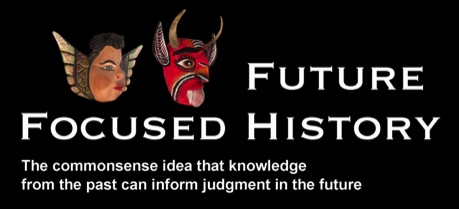"This book is intended for people who value history and believe that historical learning should be less a pointless exercise in temporarily memorizing trivial facts for the next exam, and more a quest for important knowledge from the past that can inform judgment in the future." (Introduction, p. 1)
"Any society that has developed the capacity to destroy most life on earth needs all the good judgment it can get, and there is no better place to seek it than in the long record of human experience." (Introduction, p. 1)
"Historians and educators have very different jobs to perform. The role of historians is to describe events from the past; the role of educators is to prepare students for the future." (Introduction, p. 1)
"Because educators have relied on historians to set the agenda for history schooling, history education looks very much like history: a large collection of one-time events from the past." (Introduction, p. 2)
"History is unique among school subjects in that it has no general principles of knowledge to impart. Without principles useful in the future, history is unable to fulfill the purpose of education the way other school subjects do, and the cycle of historical ignorance can repeat indefinitely." (Introduction, p. 2)
"In our society, we may learn about history, but we seldom learn from history. (Introduction, p. 2)
"Schooling exists today for the same reason it has always existed: to impart important knowledge of the world that can help students and society to function effectively in the future. (Chapter 2, p. 13)
"The Iron Law of Superficiality states: 'All other things being equal, as the number of topics increases, time per topic decreases; as time per topic decreases, the level of superficiality increases.'" (Chapter 2, p. 14)
"Without a coherent purpose to guide instruction, history education is a rudderless ship adrift at sea with no destination in mind. It's exceedingly difficult to succeed at an endeavor when you don't know what that endeavor is tying to accomplish." (Chapter 2, p. 20)
"In other [school] disciplines, principles of knowledge constitute the foundation of learning because knowledge of how the world works is a necessary prerequisite to critical thinking. In history schooling, this foundation is missing." (Chapter 2, p. 22)
"The transfer of learning from school to life beyond school is 'the ultimate purpose of school-based learning.' It is most likely to occur when general principles are learned in multiple contexts over and extended period of time." (Chapter 2, p. 23)
"Cognition (how students learn) combines with superficial content knowledge and the lack of general principles (what students learn) to yield the disturbing reality of history education: There is little point in teaching a school subject that offers little knowledge useful in the future." (Chapter 2, p 24)
"History education naturally flows to trivia, like water naturally flows downhill [releasing] a flood of information too great to be assimilated by human minds and too superficial to be of much use." (Chapter 3, p. 27)
"Habit and self-interest militate against altering the status quo." (Chapter 3, p. 28)
"Trivial content is crippling history education, and thinking skills can't save it." (Chapter 4, p. 37)
"Learning the job skills of historians often seems to be promoted as an intrinsic good, with little explanation as to how students and society might benefit from this type of knowledge." Chapter 4, p. 44)
"When history educators emphasize knowledge of the historian's skills over knowledge of history, they negate the very reason that history has been invited into schools in the first place." (Chapter 4, p. 45)
"History can't compete for time in the school day against other school subjects that not only offer thinking skills but also impart important principles of how the world works that can help students and society to function effectively in the future. (Chapter 4, p. 50)
"It's almost as though history has adopted an unwritten and unquestioned first commandment: 'Thou shalt not learn from history." (Chapter 5, p. 55)
"The bar is set extremely low for history teachers if they are considered successful when they merely entertain." (Chapter 5, p. 57)
"External sources can supply us with specific historical knowledge when needed. It's the job of education to supply the general knowledge that informs our thinking all the time." (Chapter 5, p. 59)
"It's beyond ironic that history may be the only intellectual discipline that fails to learn from history." Chapter 5, p. 61)
"A great many people may have died due to the lack of useful knowledge that we get from history education." (Chapter 5, p. 65)
"Knowledge appropriate for general education possesses three characteristics: It is relevant to the future, it is important, and it is general in nature." Chapter 5, p. 81)
"The grand assumption—if we teach it, they will learn—appears to be a grand illusion." (Chapter 6, p. 91)
"There is no separating the knowledge to be taught from the manner of teaching it. Using knowledge in the future depends on effective cognitive practices. Effective cognitive practices depend on useful knowledge to be learned." (Chapter 6, p. 95)
"We are wasting everyone's time and money unless students are taught and retaught important principles and concepts in multiple contexts over an extended period of time." (Chapter 6, p. 96)
"Prior experience is the primary indicator of future outcomes." (Chapter 7, p. 102)
"The rightful purpose of historical learning is to inform judgment in human affairs." (Chapter 7, p. 102)
"Pretend learning is concerned with memorization of facts for the next exam. Real learning is concerned with deep learning of relevant and important knowledge, retention of the knowledge in memory, and application of the knowledge in life. (Appendix, p. 181)
"Deep learning is not possible in a curriculum overtstuffed with superficial, trivial, and pointless knowledge." (Appendix, p. 181)
Quotes about history education
from the book
Future-Focused History Teaching: Restoring the Power of Historical Learning
More information: click here
____________________________________
© 2001-2019 Michael G. Maxwell, Maxwell Learning LLC
